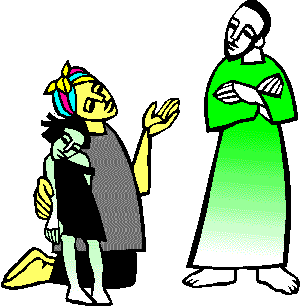The
majority of Jewish people, who worshiped God and honored the Scriptures, did
not associate with anyone who was not Jewish.
The non-Jewish people—those who were not born in a Jewish household—were
called “Gentiles” and they were rejected as apart from God and apart from the
people of God. For the most part, this
was true. Most Gentiles worshiped idols
and practiced evil, and enjoyed evil.
And so the Jewish people wanted to have nothing to do with these
types. The Jewish Sanhedrin even
established laws to separate themselves from Gentiles. There was a law that said that they may not
enter into a Gentile’s house or eat with one.
Many felt that a law should be passed that did not allow Jewish people
to eat meat in Gentile cities for fear that the meat might have been offered as
a sacrifice to an idol. Jews and
Gentiles never had anything to do with each other, if they could help it.
However, there were some Gentiles who believed in
God and wanted to worship him alone.
They were called “proselytes” and while they could never enter the
temple, it is possible that their children might be able to. Jesus had a mixed reaction to Gentiles, but
he affirmed one thing—that anyone, whether Jew or Gentile, sinner or righteous
person—anyone can come to God if they have faith. And that those who do not have faith cannot
come to God, even if they were the best Jew in the world.
Jesus
was walking near Capernum one day when a Roman Centurion came up to him,
looking for help. “I have an important
servant,” he said, “who is very ill.
Would you please heal him?” Some
Jewish men were with the centurion and witnessed that he was a righteous
proselyte who paid for their synagogue to be built. Jesus said, “Very well, let’s go to your
home.”
The Centurion stopped him however
and said, “Please don’t. I am not worthy
for you to enter my home—I don’t want you to be defiled by entering it. Look, I am a military man, and I am used to
taking orders. Everyone in my household
does as they are told. I say, ‘Do this’
and they do it. There is no need for you
to come with me. Just speak the word,
and my servant will be healed.”
Jesus was amazed at this
response. “I have never heard a Jew show
so much faith! I tell you the truth, on
the final day, there will be many people who come from far away—far from the
east or far from the west—and they will sit with the Jewish fathers, Abraham,
Isaac and Jacob. But there will be many
who are Jewish, who live in Jerusalem , who will
be thrown out of the Jewish kingdom
of God
Then Jesus turned to the Centurion
and said, “It will be as you say. Your
servant is healed.” The Centurion went
back home and found that his servant was cured in the same hour Jesus spoke the
healing.
At one point Jesus traveled to Tyre , a Gentile city north of Israel kingdom of God
Jesus then turned to her and said,
“Go away, dog. It is not allowed to take
the food of the children and throw it to dogs.”
Jewish people often called Gentiles “dogs” to show how offended they are
by them. But the woman said, “But aren’t
even the dogs allowed to eat crumbs that fall off of the children’s table? I don’t care what you call me, heal my
daughter.” Jesus was amazed. “Your faith is great! You are humble enough to accept an insult and
still ask for God’s help? Go home,
daughter. Your daughter is healed.”
As Jesus was nearing Jerusalem




No comments:
Post a Comment
Please no spam, ads or inappropriate language.